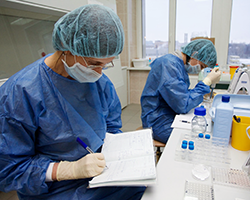A recent study conducted at the University of Gothenburg has shown that sulforaphane, a chemical compound found in broccoli sprouts, can significantly lower blood sugar levels in individuals with prediabetes. The findings suggest that this natural compound may play a role in managing the condition and preventing the onset of type 2 diabetes.
Promising Research on Sulforaphane
Researchers at the University of Gothenburg previously identified sulforaphane as a potential antidiabetic agent. A 2017 study demonstrated that people with type 2 diabetes experienced a significant reduction in blood sugar levels after taking high doses of sulforaphane extracted from broccoli sprouts. The new study, published in Nature Microbiology, focuses on individuals with prediabetes, a condition marked by rising blood sugar levels due to impaired insulin production.
Study Design and Findings
The study included 89 participants between the ages of 35 and 75 who had elevated fasting blood sugar levels, were overweight or obese, and exhibited other indicators of prediabetes. The participants were randomly assigned either sulforaphane or a placebo for twelve weeks in a double-blind format, meaning neither the participants nor the researchers knew which group received the compound. A total of 74 participants completed the study.
Results revealed that those who took sulforaphane experienced a more significant reduction in fasting blood sugar levels compared to those in the placebo group. The difference in blood sugar levels between the two groups was notable, with an even greater improvement observed in a subgroup of participants who had mild age-related diabetes symptoms, relatively lower BMI, low insulin resistance, low incidence of fatty liver disease, and lower insulin secretion.
Further analysis, conducted in collaboration with Professor Fredrik Bäckhed, identified a gut bacterium that interacts with sulforaphane, potentially enhancing the compound’s effects. In numerical terms, the differences in fasting blood sugar levels were 0.2 millimoles per liter across all sulforaphane participants, 0.4 among the clinical subgroup, and 0.7 among those in the subgroup who also had the gut bacterium.
Potential for Precision Treatment
The study highlights the need for targeted interventions in managing prediabetes, a condition affecting up to 10% of the Swedish population. Many cases remain undiagnosed, but early detection can significantly improve outcomes and prevent the progression to type 2 diabetes.
Professor Anders Rosengren, the study’s lead researcher, emphasized the potential of using sulforaphane as a precision treatment. “The treatment of prediabetes is currently lacking in many respects, but these new findings open the way for possible precision treatment using sulforaphane extracted from broccoli as a functional food. However, lifestyle factors remain the foundation of any treatment for prediabetes, including exercise, healthy eating, and weight loss,” he stated.
The study’s broader implications suggest that interactions between pathophysiology and gut microbiota may influence treatment responses, paving the way for future research on the role of diet and gut health in metabolic disorders.
Disclaimer
While these findings are promising, further research is needed to confirm the long-term effectiveness and safety of sulforaphane as a treatment for prediabetes. Individuals with prediabetes or other metabolic conditions should consult healthcare professionals before making any dietary or supplement changes.
For more information, refer to the full study: Chinmay Dwibedi et al, Effect of broccoli sprout extract and baseline gut microbiota on fasting blood glucose in prediabetes: a randomized, placebo-controlled trial, Nature Microbiology (2025). DOI: 10.1038/s41564-025-01932-w.











